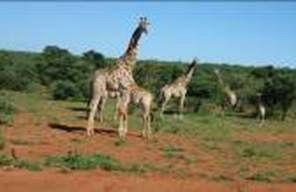If you were around a few years back you may have noticed the sudden embracing of the region of Macedonia as Greece, or more specifically, the name Macedonia . It was the period of disintegration of the country once known as Yugoslavia and a small, poor region calling itself Macedonia declared independence and laid claim to the name, not altogether inappropriate since they had been calling themselves Macedonian for the entire time they were part of Yugoslavia and perhaps for centuries before that.
The problem was that Greece, which has its own region of Macedonia became a little nervous, because what if these Macedonian neighbours to the north decided they wanted to combine with their ‘brothers’ in the south, to create a greater Macedonia, with a large port like Thessaloniki as their capital and centre of commerce? An unlikely scenario but nevertheless not an impossible one and feeling it is better safe then sorry the Greek government made a very strong effort to make it clear to the world, and themselves, that there is only one Macedonia, and it is in Greece. Everywhere you looked were signs, posters, and graffiti stating “Macedonia is 4000 Years Greek”, and the sun symbol of Alexander the great (which the Yugo-Macedons had claimed for their flag) suddenly became more visible then the blue and white of the Greek flag.
We all know what happened. Due to Greek pressure the new country was stuck with the name FYROM, a name so unromantic and difficult to say that their prospects for world domination l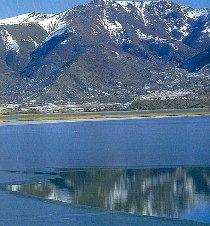 ooks dim. But the story here is Greek Macedonia, one of the most beautiful regions of Greece, and an area which will grow in importance as the commercial and cultural centre of the Balkans in the years to come.
ooks dim. But the story here is Greek Macedonia, one of the most beautiful regions of Greece, and an area which will grow in importance as the commercial and cultural centre of the Balkans in the years to come.
Now Macedonia is the second largest prefecture in Greece and its capital, Thessaloniki is the second largest city in Greece. The beautiful Prespa lakesare one of Europe’s most important bird sanctuaries and Mount Olympus is the highest mountain in Greece. Thessaloniki is rich in culture and is perhaps the most entertaining city in Greece when it comes to nightlife and eating out and is the birthplace of some of Greece’s finest musicians and basketball players. The city of Kastoria on lake Orestiada is considered to be Greece’s most beautiful city by the Greeks themselves. The Halkidiki Peninsula with its three prongs of Kassandra, Sithonia and Mount Athos run from crowded tourist resorts to beautiful remote beaches all the way to simple monasticism.
If you are looking for an area to explore, either by car or local bus, or just a place to settle in and get to know the region and its people, then Macedonia will not disappoint you.
Vergina
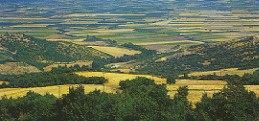 Founded by King Perdikas in the 7th Century BC it was formally known as Aigaes and was the first capital of Macedonia. When the capital was moved to Pella it was continued to be used as the royal burial grounds. In 336 BC, King Phillip II was assassinated by one of his seven bodyguards while attending the wedding of his daughter Cleopatra in the theatre.
Founded by King Perdikas in the 7th Century BC it was formally known as Aigaes and was the first capital of Macedonia. When the capital was moved to Pella it was continued to be used as the royal burial grounds. In 336 BC, King Phillip II was assassinated by one of his seven bodyguards while attending the wedding of his daughter Cleopatra in the theatre.
The Royal Palace was built for King Antigonas Gonatas, and while few of the walls that have been excavated stand very tall, the size of the area they cover is impressive. Archaeologists presume it was the summer residence of the king. The Royal Tomb has yielded great treasures, belonging to King Phillip, father of Alexander the great. All of these artefacts are in the archaeological museum in Thessaloniki which should be seen before visiting Vergina in order to get a more clear impression of what you are looking at. The tomb itself is still being excavated and is not open to the general public as of this writing. The Macedonian tomb with its facade of 4 marble columns, was a promising find when unearthed but unfortunately did not contain the vast treasures of the Royal tomb. It does contain an impressive marble throne or at least what is left of it.
Dion
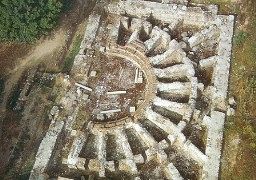 Ancient Dion was an important religious centre for worshipping the Gods of nearby Mount Olympus. This is where Phillip II came to celebrate his victories and his son Alexander came to make his sacrifices here before going off to conquer the East. While most of the statues which were not only found virtually intact, but with traces of colour, are in the nearby museum in the town of Dion, they have been replaced with copies. The Sanctuary of Isis is perhaps the most interesting discovery so far. An earthquake had displaced water and mud and the building was hidden for centuries under 6 feet of water which protected it from vandals. The temple still sits in the water and a copy of the statue of Aphrodite can be seen there.
Ancient Dion was an important religious centre for worshipping the Gods of nearby Mount Olympus. This is where Phillip II came to celebrate his victories and his son Alexander came to make his sacrifices here before going off to conquer the East. While most of the statues which were not only found virtually intact, but with traces of colour, are in the nearby museum in the town of Dion, they have been replaced with copies. The Sanctuary of Isis is perhaps the most interesting discovery so far. An earthquake had displaced water and mud and the building was hidden for centuries under 6 feet of water which protected it from vandals. The temple still sits in the water and a copy of the statue of Aphrodite can be seen there.
Pella
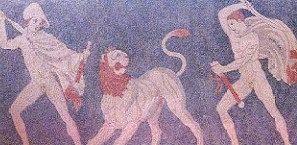 The Capital of Macedonia moved from Vergina to Pella in the 5th Century BC and was in effect the capital of Greece. Many people come here to see the exceptional mosaics discovered in the remains of houses and public buildings. The museum is one of Greece’s best on-site archaeology museums with a display of pottery, jewellery and mosaics found at the site. The remains of the buildings have impressed archaeologists and led them to believe that the Macedonians enjoyed a high level of wealth.
The Capital of Macedonia moved from Vergina to Pella in the 5th Century BC and was in effect the capital of Greece. Many people come here to see the exceptional mosaics discovered in the remains of houses and public buildings. The museum is one of Greece’s best on-site archaeology museums with a display of pottery, jewellery and mosaics found at the site. The remains of the buildings have impressed archaeologists and led them to believe that the Macedonians enjoyed a high level of wealth.
Philippi
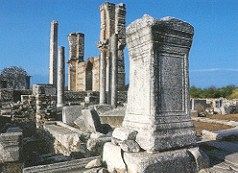 Site of the famous battle where the armies of Mark Anthony and Octavius met and defeated the armies of Julius Caesar’s assassins in 42BC. Brutas and Cassius committed suicide and the victors spent a fortune on Philippi, granting it the status of Roman Colony, providing us with the impressive ruins, and artefacts which are now in the museum. In 49 AD Saint Paul came to preach to the inhabitants of Philippi and ended up in prison. Despite Paul’s misfortune Phillipi was the first European city to accept Christianity, though the first two churches they built suffered some bad luck. The first was destroyed by an earthquake right after it was completed in the 5th century and the second collapsed before its dedication in the 6th Century because it was too top heavy. The remains can both be seen, as well as the ancient theatre built by Phillip II.
Site of the famous battle where the armies of Mark Anthony and Octavius met and defeated the armies of Julius Caesar’s assassins in 42BC. Brutas and Cassius committed suicide and the victors spent a fortune on Philippi, granting it the status of Roman Colony, providing us with the impressive ruins, and artefacts which are now in the museum. In 49 AD Saint Paul came to preach to the inhabitants of Philippi and ended up in prison. Despite Paul’s misfortune Phillipi was the first European city to accept Christianity, though the first two churches they built suffered some bad luck. The first was destroyed by an earthquake right after it was completed in the 5th century and the second collapsed before its dedication in the 6th Century because it was too top heavy. The remains can both be seen, as well as the ancient theatre built by Phillip II.
Matt Barrett is a travel writer who specializes in Greece. His Greece Travel Guides at www.greecetravel.com are considered among the best on the internet with enthralling photos and entertaining writing while at the same time being very informative. He also answers questions about Greece by e-mail at matt@greecetravel.com

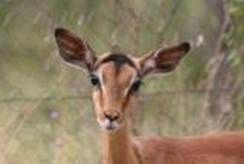 As the name suggests, Daktari is a wildlife orphanage that takes in injured, orphaned, or animals in general that for some reason can not be rehabilitated into the wild. People are educated in animal welfare, the environment and nature conservation by being part of teams which provide the nursing for the animals.
As the name suggests, Daktari is a wildlife orphanage that takes in injured, orphaned, or animals in general that for some reason can not be rehabilitated into the wild. People are educated in animal welfare, the environment and nature conservation by being part of teams which provide the nursing for the animals.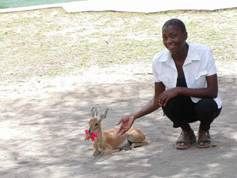 Daktari particularly targets underprivileged children from the surrounding rural areas. They are educated in the environment, life skills, and the care of the animals. Sadly, people from the local community suffer from the lack of access to their rich South African natural heritage even though they live right next to private game reserves. This has contributed to the high degree of poaching and environmental abuse in the area. We feel that by generating compassion and understanding, people will care for the environment.
Daktari particularly targets underprivileged children from the surrounding rural areas. They are educated in the environment, life skills, and the care of the animals. Sadly, people from the local community suffer from the lack of access to their rich South African natural heritage even though they live right next to private game reserves. This has contributed to the high degree of poaching and environmental abuse in the area. We feel that by generating compassion and understanding, people will care for the environment.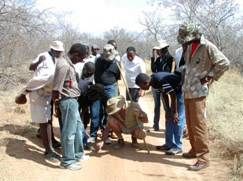 Daktari aims at inviting groups of underprivileged children to stay at the reserve, where they can learn about wildlife, teamwork, responsibility, have a hands-on experience, life skills, and by doing so, develop compassion towards animals. Unfortunately, many children end up unemployed after finishing high School. We expect that the education the children receive here will help them develop their skills and thus provide them with more work opportunities later in life, such as in the eco-tourism industry.
Daktari aims at inviting groups of underprivileged children to stay at the reserve, where they can learn about wildlife, teamwork, responsibility, have a hands-on experience, life skills, and by doing so, develop compassion towards animals. Unfortunately, many children end up unemployed after finishing high School. We expect that the education the children receive here will help them develop their skills and thus provide them with more work opportunities later in life, such as in the eco-tourism industry.